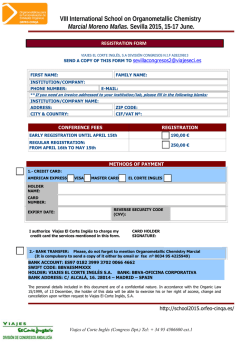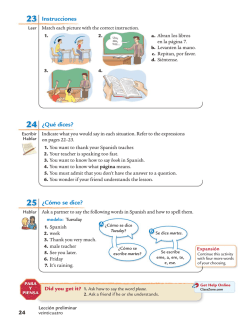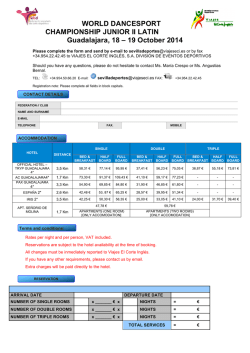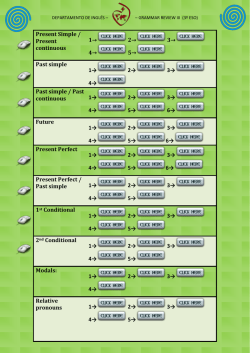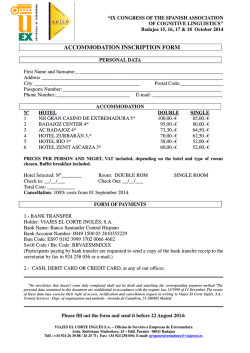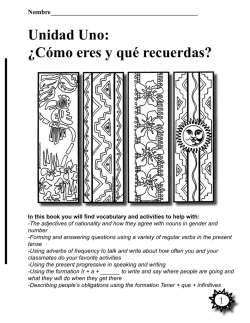
Document
5 -1 SIMPLE PRESENT vs. PRESENT PROGRESSIVE Inglés FUTURE TENSE Simple Present expresses habits or usual activities. (Base form of verb + s-if 3rd person singular) Present Progressive expresses actions that are happening right now. (am + is - are) Nonaction verbs are not used in the present progressive: want, need, like, love, hate, hear, see, smell, taste, understand, know, believe, think that, possess, exist, belong, prefer, forget, remember. Future Tense is expressed by using (am, is, are + verb and will + verb). Both are used to make predictions. The first expresses a preconceived plan. The second is used to volunteer or expressed willingness. Complete the sentences with be going to or will. 1. I arranged to borrow some money because I__________________ buy a motorcycle tomorrow. Complete the sentences about a businessman, Tony Martin. Use the correct form of the verbs in parentheses. 2. Can I borrow this book? Sure. But I need it back soon. I __________________ return it to you tomorrow. Okay? 3. I __________________ wear a dark suit to the wedding reception. How about you? I´m not sure. 4. So you __________________ get married. That´s right. On September 22nd. My congratulations. 1. It is 8:00 A.M. Tony Martin ____________________ (drive) to work. 2. 3. Today it ____________________ (take) longer. Normally, he ____________________ (take) 4. Route 93. The radio is on, and Tony ____________________ (listen to) the traffic report. 5. The announcer ____________________ (describe) an accident on Parson Road. 6. He ____________________ (know) he can´t do anything about the traffic conditions. CONTINÚE EN LA SIGUIENTE PÁGINA 5 Inglés 2- PRESENT, PAST, PAST PARTICIPLE, AND MEANING OF MOST COMMON IRREGULAR VERBS GROUP I. Three different forms. PRESENT begin do drink go ring shrink sing sink swim PAST began did drank went rang shrank sang sank swam PAST PARTICIPLE begun done drunk gone rung shrunk sung sunk swum MEANING empezar, comenzar hacer, (auxiliar) tomar, beber ir timbrar encoger cantar hundir(se), naufragar nadar GROUP II. The participle ends in “n” PRESENT Be (am, is, are) blow draw drive fly grow know see tear throw wear PAST PAST PARTICIPLE MEANING was / were been ser, estar (tener X años, frío, blew drew drove flew grew knew saw tore threw wore blown drawn driven flown grown known seen torn thrown worn soplar dibujar, jalar manejar volar crecer, cultivar, criar conocer, saber ver romper, rasgar arrojar, tirar, lanzar usar ropa, llevar puesto CONTINÚE EN LA SIGUIENTE PÁGINA 5 -3 Inglés GROUP III. Past participle ends in “en”. PRESENT beat bite break choose eat fall freeze forget forgive give hide ride rise shake speak steal take wake up write PAST beat bit broke chose ate fell froze forgot forgave gave hid rode rose shook spoke stole took woke up wrote PAST PARTICIPLE beaten bitten broken chosen eaten fallen frozen forgotten forgiven given hidden ridden risen shaken spoken stolen taken woken up written MEANING batir, golpear derrotar, morder, picar insecto quebrar(se) escoger comer caer congelar(se) olvidar perdonar dar, regalar esconder cabalgar, montar elevar (se), ascender, (por sí mismo) sacudir menear,temblar hablar robar tomar, coger, llevar despertar (se) escribir CONTINÚE EN LA SIGUIENTE PÁGINA 5 Inglés 4- GROUP IV. Past and past participle are the same. PRESENT PAST PAST PARTICIPLE MEANING bend bind bleed bring build buy catch feed feel fight find get hang have hear hold keep lead leave lay lend light lose mean make meet pay read say seek sell send shine shoot sit sleep spend stand strike sweep teach tell think understand win wind bent bound bled brought built bought caught fed felt fought found got hung had heard held kept led left laid lent lit lost meant made met paid read said sought sold sent shone shot sat slept spent stood struck swept taught told thought understood won wound bent bound bled brought built bought caught fed felt fought found got, gotten hung had heard held kept led left laid lent lit lost meant made met paid read said sought sold sent shone shot sat slept spent stood struck swept taught told thought understood won wound doblar, agachar atar, apretar, encuadernar sangrar traer construir comprar atrapar, pescar alimentar sentir pelear encontrar obtener, llegar ahorcar, colgar tener, auxiliar=haber oir, escuchar sostener, contener mantener, conservar dirigir dejar,salir,abandonar colocar, poner,extender prestar encender, iluminar perder, extraviar significar hacer, fabricar, preparar encontrar (persona), ser presentado pagar leer decir buscar vender enviar, mandar brillar, pulir disparar sentarse dormir gastar (dinero), pasar (tiempo) pararse, estar de pie golpear, sonar barrer enseñar decir, contar pensar entender, comprender ganar (juego) dar cuerda CONTINÚE EN LA SIGUIENTE PÁGINA 5 -5 Inglés GROUP V. No change PRESENT bet cost cut fit hit hurt let put set shut spread PAST bet cost cut fit hit hurt let put set shut spread PAST PARTICIPLE bet cost cut fit hit hurt let put set shut spread MEANING apostar costar cortar quedar a medida, encajar golpear herir, lastimar permitir colocar, poner arreglar, colocar cerrar de golpe extender, esparcir, divulgar GROUP VI. Past participle the same as the present. PRESENT become come run PAST became came ran PAST PARTICIPLE become come run MEANING convertirse, ser apropiado venir correr CONTINÚE EN LA SIGUIENTE PÁGINA 5 Inglés 6- PRESENT PERFECT vs. PRESENT PERFECT PROGRESSIVE PRESENT PERFECT or SIMPLE PAST TENSE Present Perfect expresses repeated activities or situations that occurred at some unspecified time in the past. It also expresses situations that began in the past and continue to the present. (have, has +pp) Present Perfect Progressive expresses the duration of an activity that is in progress, i.e., how long something has continued to the present time. (have, has + been + v-ing). With some verbs (e.g., live, work, teach), duration can be expressed by either the present perfect or the present perfect progressive with essentially the same meaning. A journalist is interviewing a woman about marriage. Complete the interview with the correct form of the verbs in parentheses. 1. Mr. Alvarez __________________ (work) at the power company for fifteen years. He likes his job. Interviewer: And, when _______________ you _______________ your first child? 4. (have) 2. My eyes are getting tired. I __________________ (read) for two hours. I think I will take a break. Woman: Well, I _______________ a mother pretty quickly. 5. (become) 3. Mark __________________ (watch) TV since seven o´clock. We_______________ Stephanie ten months after we 6. (have) _______________ married. 7. (be) SIMPLE PAST vs. PRESENT PERFECT Simple Past talks about activities or situations that began and ended at an specified time in the past. (verb + ed or irregular). Present Perfect expresses repeated activities or situations that occurred at some unspecified time in the past. It also expresses situations that began in the past and continue to the present. (have, has +pp). Have you ever been in Europe? Yes, I __________________. I __________________ (be) in Europe several times. In fact, I __________________ (be) in Europe last year. 2. What European countries __________________ (you, visit)? I __________________ (visit) Hungary, Germany, and Switzerland. I __________________ (visit) Hungary in 1988. I __________________ (be) in Germany and Switzerland in 1990. Interviewer: How long have you been married? 1. (be) Woman: Let´s see. We _______________married in 2. (get) 1993, so we ____________ married for just a few years. 3. (be) Interviewer: You say this is not your first marriage. How long _______________ your first marriage _______________? 8. (last) Woman: About two years. We _______________ in 1985. 9. (divorce) Interviewer: _______________ you _______________ any kids? 10. (have) 1. Woman: No, we _______________ . 11. (have) Interviewer: Do you still see your first husband? Woman: Yes. We _______________ friends. In fact, 12. (remain) I_______________ him last week. He and Joe 13. (see) _______________ friends, too. 14. (become) CONTINÚE EN LA SIGUIENTE PÁGINA 5 -7 Interviewer: _______________ he _______________? 15. (remarry) Inglés SIMPLE PAST vs. PAST PERFECT Woman: No, he _______________ 16. Simple Past talks about activities or situations that began and ended at an specified time in the past. (verb + ed or irregular) Past Perfect expresses an activity that occurred before another time in the past. (had + pp) Interviewer: In your opinion, why _______________ your first marriage _______________? 17. (fail) 1. Woman: I think that we _______________ married 18. (get) too young. We _______________ each other well enough. 19. (not know) By the time I __________________ (go) to bed last night, I __________________ (finish, already) my homework. 2. 3. I was late. The party __________________ (start already) by the time I __________________ (get) there. The candidate __________________ (not reach) the age of 35 by the time of the election. Interviewer: Where _______________ you _______________ Joe? 20. (meet) Woman: In Atlanta. We _______________ both students there. 21. (be) Interviewer: And when _______________ you _______________ to Los Angeles? 22. (move) Woman: This year. Los Angeles is the third city we _______________ in! Joe teaches college, and it is 23. (live) hard to find a permanent job these days. CONTINÚE EN LA SIGUIENTE PÁGINA Inglés 5 8- MODALS Modals are similar to verbs, but they never change forms. Modals always stay the same, even when the subject changes. Use the simple form of the verb after all modal auxiliaries. (modal + base form of verb). WOULD Request action (formal) Request action (formal-informal), request permission (in questions), past ability, COULD present or future possibility BE ABLE TO Present, past or future ability CAN Informal request, present or future ability, give permission CAN’T Present impossibility, deny permission WILL Future, request action (informal) MAY Request or give permission – formal, present or future possibility MIGHT Present or future possibility SHOULD Present expectation, advice OUGHT TO Expectation (af.), advice (af.) HAD BETTER Strong advice WOULD RATHER Preference (in neg. Not comes after rather) WOULD LIKE Desire MUST Expresses necessity or obligation, logical conclusion MUST NOT Prohibition, negative logical conclusion HAVE TO Expresses necessity or obligation DON’T HAVE TO Lack of necessity or obligation CONTINÚE EN LA SIGUIENTE PÁGINA 5 -9 1. The teacher __________________ you the answer. (present ability - tell) 2. The child __________________ to color the book. (desire) Inglés Conversation Scott is getting ready for a job interview. Complete his conversation with a friend. Use should, ought to, and had better. Sometimes more than one answer is possible. 3. Bill _________________ us with the work any time. ( present ability - help) Scott: Should I wear my green suit? 1. wear 4. We ________________ home in a few minutes. Dennis: I don´t think so. I think _________________ 2. wear your navy blue one. It´s more conservative. (present possibility - leave) Scott: _______________ my boss about the interview? 3. tell Contrast: Must, Must not, Have to, Don´t have to, and Can´t Read these test questions about road signs. Complete the answer using the correct verb. 1. When you see MAXIMUM SPEED 65 MINIMUM SPEED 45 it means: You _________________________ drive 70 miles per hour. Dennis: No. _______________ until you get a job 4. wait before you say anything to your old boss. Scott: I think we´re going out for lunch after the interview. _______________ to pay? 5. offer Dennis: I don´t think so. They ____________ for 6. pay your lunch. The interviewer usually does that. Scott: _______________ a thank-you note after the interview? 7. write Dennis: That´s always a good idea. Scott: When _______________ it? 8. send Dennis: _______________ a few days. That way 9. wait you can always include something you forgot to say during the interview. Scott: Well, _______________ to say anything important! 11. not forget Dennis: Try to relax. I´m sure you´ll do fine. Scott: I hope so. _______________ you after the interview? 11. call Dennis: _______________ me or I´ll never speak to you again! 12. call CONTINÚE EN LA SIGUIENTE PÁGINA 5 Inglés 10- ACTIVE vs. PASSIVE VOICE Active (Subject (doer) + Verb + Object) Passive: The object of an Active sentence becomes the subject of a Passive sentence (Object+Be + pp + by + subject). The tense of the verb BE matches the tense of the original action verb. If it is important, the subject can be mentioned at the end, using by. Only transitive verbs can be used in the passive. Active: The news surprises me. surprised are surprising have surprised will surprise might surprise should have surprised Passive: I am surprised by the news. I was surprised by the news. I am being surprised by the news. I have been surprised by the news. I will be surprised by the news. I might be surprised by the news I should have been surprised by the news. That letter __________________ (ought to send) immediately. Those letters __________________ (arrive) yesterday. CONTINÚE EN LA SIGUIENTE PÁGINA 5 -11 Inglés Complete the sentence Choose the one answer that best completes the sentence. 1. The congressional committee _ _ _ _ _ all foreign aid funds. (A) (B) (C) (D) 2. The commissioners told the journalists that the problem _ _ _ _ _ care of already. (A) (B) (C) (D) 3. were cut was cut cut cut it has taken had been taken will take will be taken The early settlers _ _ _ _ _ the land for pasture. (A) (B) (C) (D) were cleared cleared were being cleared clearing In the sentences below, identify the one underlined phrase that is incorrect. 1. Although some difficulty was expected, the extent (A) of the problem was not known until the project (B) completed and the final report was distributed. (C) (D) 2. Metal must be hammered, worked, and cooled (A) rapidly to relieve internal stresses causing by (B) (C) (D) heating. 3. Risks that are taking by today’s entrepreneurs are (A) considerable and, while stimulating, pose threats (B) (C) (D) to their financial security. CONTINÚE EN LA SIGUIENTE PÁGINA 5 Inglés 12- ADJECTIVES and ADVERBS: COMPARATIVE - SUPERLATIVE COMPARATIVE Compares 2 things. Add -er to most one syllable words. Add more before most 2 syllable and longer words. 2 syll. words ending in -y: change y to i and add -er . A comparative is followed by than. Irregular comparatives: good, well, bad, badly, far. The opposite of -er, more is less. Equal comparative: as + adj. or adv. + as Very modifies adjectives or adverbs. However, very is not used to modify comparatives. Instead, much; Tom is much older than Joe. a lot of, or far are modifying comparatives. SUPERLATIVE Compares one part of a whole group to the rest. Add -est to most one syllable words. Add most before most 2 syllable and longer words. 2 syll. words ending in -y: change y to i and add -est A superlative is preceded by the. Irregular superlatives: good, well, bad, badly, far. The opposite of -est, most is least. Find and correct errors: 1. Alaska is large than Texas. 2. Alaska is largest state in the United States. 3. Old shoes are usually more comfortable that new shoes. CONTINÚE EN LA SIGUIENTE PÁGINA 5 -13 Inglés Write “C” if the sentence is correct. Write an “I” if there is an error in the comparative pattern and correct it. Write “C” if the sentence is correct. Write an “I” if there is an error in the superlative pattern and correct it. ____ 1. Since there were two possible ways to get to New York, we had to decide which one was better. ____ 1. W. Germany is one of the most industrialized nations in the world. ____ 2. ____ 2. Nancy was luckier than Fred in Las Vegas. August is hottest and most humid month of the year. ____ 3. ____ 3. Betty’s homework is usually more organized than that of any other student’s in the class. They sold the most sophisticated computer that we had ever found. CONTINÚE EN LA SIGUIENTE PÁGINA 5 Inglés 14- CONDITIONAL SENTENCES 2. There are two types of Conditional Sentences: Real or Unreal. (A) (B) (C) (D) Conditional Sentences are made of 2 clauses: If clause and Result clause. Real are conditions that are possible or even probable to happen in the present or future. If + simple present ..…,will + base form of verb. Unreal are conditions that probably will not happen, (contrary-to-fact), in the present or future. If + simple past ….., would + base form of verb. Unreal, contrary-to-fact in the past If + past perfect (had +pp) …..,would have, could have + past participle. (It can also be used without the if switching subject and had: “Had I known the results, I could have prevented it.”). I didn´t feel well yesterday. If I Because Mr. Gleason worked only a month, the personnel director would not write a recommendation for him even if he _ _ _ _ _ . 3. could ask ask asked will ask The teaching assistant’s explanations to the class will be more understandable if he _ _ _ _ _ more clearly next time. (A) (B) (C) (D) speaks spoke will speak has spoken __________________ (feel) better, I __________________ (come) to class yesterday. I don´t feel well today. If I __________________ (feel) better, I __________________ (take) a walk. I have a cold today, but I will probably feel better tomorrow. If I __________________ (feel) better tomorrow, I __________________ (go) to class. I´m sorry that you didn´t go to the party. If you __________________ (come), you _________________ (have) a good time. Choose the one answer that best completes the sentence. 1. If they _ _ _ _ _ overworked in the beginning, the volunteers would have helped finish the project. (A) (B) (C) (D) were not was not had not been have not been CONTINÚE EN LA SIGUIENTE PÁGINA 5 -15 Inglés In the sentences below, identify the one underlined phrase that is incorrect. 1. Had they known the snowstorm would be so (A) (B) treacherous, the hikers did not venture into it (C) (D) without proper equipment. 2. I think I would enjoy the movie we went to last (A) (B) night even more if I had read the book before (C) seeing it. (D) 3. If all the members of the committee who are (A) (B) present would agree, the proposal will go into (C) effect immediately. (D) CONTINÚE EN LA SIGUIENTE PÁGINA 5 Inglés 16- PREPOSITIONS Prepositions are words that show relationship between a noun or a pronoun and another word in a sentence. The following prepositions introduce information in the categories of time, place, and other: TIME after before during until PLACE under in / into / within out around outside between over above below beside near . . . PLACE behind through up inside to among by across beneath beyond without OTHER about against off past with except due to such as for at onto . . . OTHER from in order of because of like of Most common prepositions: in, on, at with time and places: Dates in: months, years, centuries on: days of the week, complete dates at: specific time Places in: suburbs, cities, countries on: name of street, avenue at: complete address CONTINÚE EN LA SIGUIENTE PÁGINA 5 -17 Inglés Choose the one answer that best completes the sentence. In the sentences below, identify the one underlined phrase that is incorrect. 1. 1. The chemist placed the bowl _ _ _ _ _ the two test tubes. (A) (B) (C) (D) 2. The rain fell so heavily that it leaked _ _ _ _ _ the ceiling. (A) (B) (C) (D) 3. among between in through at over against through The young politician brings to her work on the (A) city council the expertise that makes her stand out in a crowd, puts her above the (B) (C) competition, and places her under her rivals. (D) 2. Local governments were urged to cut forward on (A) (B) (C) their own construction plans in order to reduce (D) high housing costs. Some of the land originally taken from Native Americans has been _ _ _ _ _. (A) (B) (C) (D) given to given back handed out handed in CONTINÚE EN LA SIGUIENTE PÁGINA 5 Inglés 18- SUBORDINATING CONJUNCTIONS An Independent clause expresses a complete thought and can stand alone. My aunt went to Florida. A subordinate clause cannot stand alone. when she retired. Notice that it begins with a conjunction. Combined with an independent clause, the subordinate clause completes the meaning of the sentence. My aunt went to Florida when she retired. Subordinating conjunctions (markers) used to join the clause to the rest of the sentence: after since when which so that whose as as if if while as though although because whenever wherever in order that provided that as long as as soon as who before where whom how than though unless whether as soon as until Complete these sentences with independent or subordinate clauses, circle the conjunction used or stated: When he came, _________________________________ We waited for her until____________________________ _________ Sasha _____ her brother could locate the car. _________ I prefer apples, I also like strawberries. (When / After) a few years, they were producing more food than they could eat. (Until / Whenever) people work together, they accomplish much more. Choose the one answer that best completes the sentence. 1. (A) (B) (C) (D) These markers substitute for the duplicate noun or noun phrase when you are combining two sentences into one. Example: 2. The man is very friendly. He lives next door. The man who lives next door is very friendly. Read the two sentences and then combine them to write one with the same meaning. One of them becomes a subordinate clause. The girl is now in the hospital. She was injured in the accident. _ _ _ _ _ was not the way the event happened. Regarding our current Director of Finance, _ _ _ _ is of no consequence to me. (A) (B) (C) (D) 3. 4. he goes or stays whether he goes or stays whether he go or stays he goes whether he stays The corporation whose _ _ _ _ _ first will host the delegation for lunch. (A) (B) (C) (D) __________________________________________ __________________________________________ __________________________________________ ___ What the press reported What reported the press What reported The press reported plant we visit visit plant we visit we plant we plant visit While tomatoes are in season, _ _ _ _ _. (A) (B) (C) (D) an inexpensive they are inexpensive inexpensive besides inexpensive CONTINÚE EN LA SIGUIENTE PÁGINA _ 5 -19 5. Inglés _ _ _ _ _ the rain has stopped, the field will dry out. (A) (B) (C) (D) READING COMPREHENSION Consider the following recommendations: Though While Even if Now that PRONOUNS Subject I you he she it we you they Object me you him her it us you them Possessive mine yours his hers its ours yours theirs Use any pronoun mentioned above _____ (Mr. Brown) wrote a note on my test and _____ (Rose´s and Joe´s). _____ (Ann) ate dinner with _____ (Norman and I). _____ (Those children) should obey _____ (their parents). Exercise: Write “C” if the sentence is correct. Write “X” is there is an error in pronoun case. _____1. I was surprised to learn that Betty and him were hurt in the accident. _____2. The tourists asked us, my cousin and me, how to get to the museum. Those toys are ours. _____3. Pre-reading, Predicting: Before reading you must consider some characteristics in the form, such as title, subtitles, paragraphs, form in which it was printed, key words, pictures, etc. Scanning: Looking for specific information quickly. It is not necessary to read every word. Skimming: Ability to read a text to find the main idea and the overall organization of ideas. The first and/or last sentence(s) of a paragraph usually contain(s) essential information. Be able to distinguish between fact and opinion. Vocabulary: If a word is unknown, be able to infer its meaning in context. Underline main idea: (1) The Stone Age was a period of history which (1) began in approximately 2 million B.C. and lasted until 3000 B.C. Its name was derived from the stone tools and weapons that modern (5) scientists found. This period was divided into (5) the Paleolithic, Mesolithic, and Neolithic Ages. During the first period (2 million to 8000 B.C.), the first hatchet and use of fire for heating and cooking were developed. As a result of the Ice (10) Age, which evolved about 1 million years into (10) the Paleolithic Age, people were forced to seek shelter in caves, wear clothing, and develop new tools. During the Mesolithic Age (8000 to 6000 B.C.), (15) people made crude pottery and the first fish hooks, took dogs hunting, and developed the bow and arrow, which were used until the fourteenth century A.D. The Neolithic Age (6000 to 3000 B.C.) saw (20) humankind domesticating sheep, goats, pigs, and cattle, being less nomadic than in previous eras, establishing permanent settlements, and creating governments. 1. Into how many periods was the Stone Age divided? (A) (B) (C) (D) 2 3 4 5 CONTINÚE EN LA SIGUIENTE PÁGINA 5 Inglés 2. In line 3 the word derived, as used in the passage, means (A) (B) (C) (D) 3. 8. (A) (B) (C) (D) People were inventive. People stayed indoors all the time. People were warriors. People were crude. 10. In line 22 the word eras, as used in the passage, means (A) (B) (C) (D) families periods herds tools Farming Clothing Living indoors Using fire extravagant complex vulgar primitive The author states that the Stone Age was so named because (A) (B) (C) (D) 7. Which of the following best describes the Mesolithic Age? In line 15 the word crude, as used in the passage, means (A) (B) (C) (D) 6. Fish hook Hatchet Bow and arrow Pottery 9. Which of the following developments is NOT related to the conditions of the Ice Age? (A) (B) (C) (D) 5. originated destroyed hallucinated discussed Which of the following was developed earliest? (A) (B) (C) (D) 4. 20- it was very durable like stone the tools and weapons were made of stone there was little vegetation the people lived in stone caves In line 21 the word nomadic, as used in the passage, means (A) sedentary (B) wandering (C) primitive (D) inquisitive With what subject is the passage mainly concerned? (A) (B) (C) (D) The Neolithic Age The Paleolithic Age The Stone Age The Ice Age CONTINÚE EN LA SIGUIENTE PÁGINA 5 -21 Inglés BIBLIOGRAPHY English level 10 By J. A. Senn and Carol Ann Skinner D. C. Heath and Co. 1992 Fundamentals of English Grammar by Betty Schrampfer Azar Prentice- Hall Regents 1992 Focus on Grammar Workbook An Intermediate Course for Reference and Practice by Marjorie Fuchs Longman Grammar Series Addison-Wesley Publishing Co., Inc. 1994 Grammar Dimensions 2: Form, Meaning, and Use by Diane Larsen-Freeman Heinle & Heinle Publishers 1997 Macmillan English : Thinking and Writing Processes Scribner Laidlaw. Collier Macmillan Canada, Inc. 1988 Move Up Advanced by Simon Greenall Heinemann Eng. Language Teaching 1996 Reading and Understanding Books 1 & 2 by Rosa María Durán and Eric Pearse McGraw-Hill / Interamericana 1992-1994 Writer´s Choice Grammar Workbook 9 Glencoe / McGraw-Hill 1996 CONTINÚE EN LA SIGUIENTE PÁGINA
© Copyright 2026
